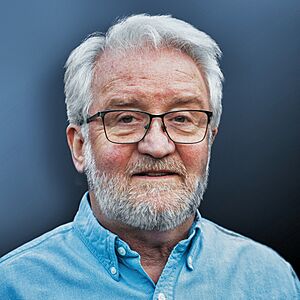Andrew Fabian facts for kids
Quick facts for kids
Andrew Fabian
|
|
|---|---|
 |
|
| 86th President of the Royal Astronomical Society | |
| In office 2008–2010 |
|
| Preceded by | Michael Rowan-Robinson |
| Succeeded by | Roger Davies |
| Personal details | |
| Born |
Andrew Christopher Fabian
20 February 1948 |
| Nationality | British |
| Spouse | |
| Education | Daventry Grammar school |
| Alma mater | King's College London (BSc) University College, London (PhD) |
| Awards |
|
| Scientific career | |
| Fields | Astronomy |
| Institutions | Institute of Astronomy, Cambridge University of Cambridge |
| Thesis | The small scale isotropy of the cosmic X-ray background (1972) |
| Doctoral advisor | Peter W. Sanford |
| Doctoral students |
|
Andrew Christopher Fabian was born on February 20, 1948. He is a famous British astronomer and astrophysicist. He has spent many years studying the universe.
From 2013 to 2018, he was the Director of the Institute of Astronomy at the University of Cambridge. Before that, he was a special research professor at the same institute from 1982 to 2013. He also served as the president of the Royal Astronomical Society from 2008 to 2010.
Contents
Learning About the Stars
Andrew Fabian studied at King's College London, where he earned his Bachelor of Science degree in Physics. He then continued his studies at the Mullard Space Science Laboratory at University College London. There, he earned his PhD, which is a very high academic degree.
A Career in Astronomy
Andrew Fabian has had a long and exciting career in astronomy.
Sharing Knowledge with Everyone
From 1982 to 1984, he was the Gresham Professor of Astronomy at Gresham College. In this role, he gave free public lectures in London. This helped many people learn about space and the stars.
He also worked as the main editor for the astronomy journal Monthly Notices of the Royal Astronomical Society. He held this important position from 1994 to 2008.
What Andrew Fabian Studies
Andrew Fabian's research focuses on many fascinating parts of space. He studies huge groups of galaxies called galaxy clusters. He also looks at active galactic nuclei, which are super bright centers of galaxies.
His work often involves black holes, which are areas in space where gravity is so strong that nothing, not even light, can escape. He also researches the X-ray background, which is a glow of X-rays coming from all directions in space.
In the past, he also studied X-ray binaries, which are systems of two stars that give off X-rays. He looked at neutron stars, which are very dense stars, and supernova remnants, which are the remains of exploded stars.
Much of his research uses X-ray astronomy. This means he uses special telescopes that can detect X-rays from space. These X-rays help scientists understand very hot and energetic events in the universe.
One of his big achievements was helping to discover something called "broad iron lines." These are special signals of X-rays that come from active galactic nuclei. For this discovery, he received a special award called the Bruno Rossi Prize. He has written over 1000 scientific articles and leads the X-ray astronomy group at the Institute of Astronomy.
Awards and Special Recognition
Andrew Fabian has received many important awards for his work:
- In 2008, he was given the Dannie Heineman Prize for Astrophysics by the American Astronomical Society.
- In 2012, he received the Gold Medal of the Royal Astronomical Society. This is one of the highest honors in astronomy in the UK.
- In 2016, he was elected as a foreign associate of the National Academy of Sciences. He also received the Bruce Gold Medal from the Astronomical Society of the Pacific.
- In 2020, he was awarded the Kavli Prize for Astrophysics. This is a very prestigious international award.
In August 2020, Andrew Fabian was a guest on the BBC Radio 4 program 'The Life Scientific'. He talked about his life and work in science.
 | Precious Adams |
 | Lauren Anderson |
 | Janet Collins |

